#unnecessary essays
Explore tagged Tumblr posts
Text
Star Wars x Classical Mythology
1: Satine Kryze as Dido, Queen of Carthage

"Hedged by the spears of her guards, she throned herself on high
[...] O queen, who, under God, have founded a new city
And curbed the arrogance of proud clans with your justice..."
- Virgil, The Aeneid
Both Satine and Dido were powerful, independent leaders who built their cities from nothing to prosperity following a past fraught with civil conflict and loss. Although both Mandalore and Carthage have been known for their prowess in war, Satine and Dido each managed to sustain a period of peace despite external pressures.
My favourite Dido anecdote is how, when she was looking for a site to found her new city, she was handed an oxhide and told she could only have as much land as could be encompassed by that hide. So she cut it into thin strips, used it to encircle an entire hill and said "cool, my hill now" which is irrelevant except it strikes me as something Satine would do too.
But Dido is consistently referred to in The Aeneid as "ill-fated" and "ill-starred". There is an understanding that she was doomed from the beginning and, much like Satine was always intended to die, her story was over before it was even written.
But the main reason I chose Dido for Satine is because their respective narratives don't actually care about their political accomplishments. They aren't remembered for the good they did for their people or for what they achieved, but for the men they died for (i.e. Aeneas and Obi-Wan). Their respective doomed love stories take precedence over their politics and their ideals.
They are also both the subject of a lot of disproportionate, mostly-unfounded hate, but that's a whole other post.
Bo-Katan
#the other thing satine and dido have in common is my ability to write 5000+ word essays defending them#and people ask me what i'll use my classics degree for#unnecessary star wars parallels obviously#satine kryze#star wars#duchess satine#the clone wars
77 notes
·
View notes
Text
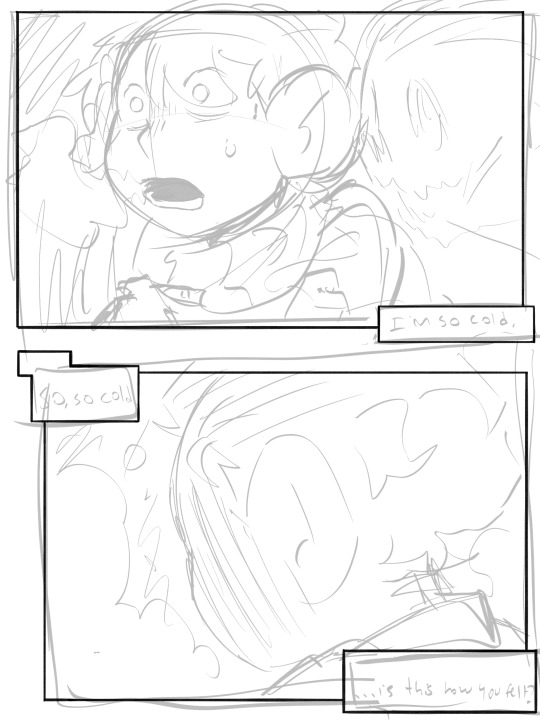
Wip
#wip#I finished the panels and speech bubbles so I’m taking a break to get an ice cream sandwich then coming back to do lineart#Honestly the worst thing about making these comics is that I can’t depict some of the stuff I really want to depict#Bc decent storytelling requires restraint#But I think a lot about everything and so I put an unnecessary amount of thought into this shit that I can’t reasonably add to the comic#Without making it feel out of character or just sorta tonally weird (admittedly I feel like I stretch it too thin as it is)#The reason I do these besides just bc I like making them and it’s fun is bc I am fascinated with Chilchuck as a character#And I have a very specific idea of his life based on the crumbs Ryoko Kui leaves us#Which I wanna. Like. Force other ppl to witness I guess 😭#But character exploration without any proper storytelling to frame it is boring to me#like I might as well just write it all out in an essay at that point#Anyways all that to say that I am annoyed that my comic about what Chilchuck saw when he said he saw his dad on the other side#Doesn’t leave room for me to show that I think his dads death indirectly led to Meijack being born and clarify why and how I think that hap#And that the whole sequence of events there is too long and unrelated to reasonably fit into those little extras I do sometimes
57 notes
·
View notes
Text

my ultimate takeaway from this essay (published 2006) is that it does accurately capture how most viewers respond to sam vs dean as well as sam’s original function as the audience surrogate btwn the two brothers, but it isn’t critical enough of the show’s values - to be fair, expected for the time - and thus does not question whether its characterizations of sam as “bitchy” and “selfish” (in comparison to dean, as always) hold merit at all. it is simultaneously far too accepting of dean’s facade as something purely Aspirational for everyone in the audience.

again, to be fair to the author, this piece was written after only one season of the show had aired, but even as early on as s1 - before dean had absorbed john’s patriarchal role - there were cracks in dean’s larger-than-life facade that the same viewers he consistently distracts from sam with his Dazzlingly Masculine edge dramatically overemphasize to be able to justify their attribution of every “relatable” trait that sam demonstrates much more clearly and intentionally than dean to dean alone, as if the core contrasts between these two characters don’t affect everything about the show. I don’t think it’s accurate to claim that it’s as simple as dean is who we want to be and sam is who we really are. this assumption relies on a usually-subconscious reading of most surface-level dean traits as “good” (strong, manly) and most surface-level sam traits as “bad” (weak, girly). in fact for me personally sam is who I’ve always wanted so dearly to be but I see more of myself in dean than I would like, which makes me very sad as I am unable to gloss over the reality of dean as a monumentally flawed character who does immense damage to himself and others from his uncontested position of authority. if you view the (abuse-enabling) family structure as fundamentally good and surpassing all other forms of human connection, of course you’ll agree with dean/john and (to a lesser but still noticeable extent) the show’s writers that sam was selfish to “walk away” from it in pursuit of a life on his own terms, as opposed to seeing him as I did when I was a miserable teenager as incredibly brave and aspirational for having done so.

I’ll give them this too: the show IS to the bitter(sweet to some) end ultimately about the burden of being “sammy”; to the discerning viewer this never stopped being the case even when the writers finally let their idealization of dean’s facade lull them into swapping him into the Main Character seat in sam’s place, to the overall detriment of the story… although from what I’ve seen no dean-biased viewer would be able to point to this switch as being responsible for the lack of focus and confused emotional beats of the late seasons. the expansion of dean’s role in tandem with the shrinking of sam’s is absolutely beautiful horror for fanartists willing/able to transform the source material with an understanding of why those original surface-level dean traits were only ever amplified over time whereas the definitive surface-level sam traits that primarily existed to further idealize dean’s facade were steadily chipped away at to the point that the audience discusses “bitchy sam” as if he is a relic of the early seasons, and otherwise tends to dismiss the final canon iterations of him as so gentle and toothless as to be “boring.” mind you, this is the same audience that was numbly swayed by the narrative into believing that sam’s anger (suspicious) was a character defect while dean’s anger (righteous) was an asset, and the same audience that carried their narrative-supplied/dean-supplied idea of sam as “selfish” into the last season of the show (s8) that portrayed him pushing back against his restrictive role as “sammy.” every version of sam was doomed to inadequacy for the majority of this audience, because of sam and dean’s respective roles.
TL;DR I wish this shit was easier to summarize so you’d know why I disagree with almost everyone who comments on this show <3
#the audience versus sam and dean#research hole#wrote this up instead of sleeping or anxiously ruminating 🥴#also: even for me this essay was WAY too heavy on the parentheticals lmfaooo#like just unnecessary after the establishing paragraphs#archive later
20 notes
·
View notes
Text
Making sense of the “childhood connection” in Love Scout
The Episode 9 preview has pretty much confirmed that Jiyun’s father died saving Eunho – a plot point that I foresaw but have been dreading. Beyond the fundamental improbability of these two people being connected in this way, I was of the position that Jiyun holds too much resentment towards her father to be satisfyingly resolved in so few episodes. However, since the writing and characterisation thus far has been so thoughtful, I wanted to try approaching this not as something to forgive/ignore in the show, but rather something that might make sense for character growth and healing. That is, I think it’s worth considering this childhood connection beyond ‘trope for the sake of trope’, and instead delve more deeply into its potential narrative function.
In Jiyun’s mind, she has judged her father to be a “bad father”; a “liar” for telling her he’d always be by her side, and then making a choice that resulted in his death. This one-dimensional villainisation of her father makes it easier for her to deal with this perceived abandonment – by minimising him and his value to her, she reduces the magnitude of his loss, and therefore of her own grief. Without any form of destabilisation of this narrative she has constructed, she could probably have gone the rest of her life without truly processing his death. Even Eunho – in a scenario where he was not directly involved in the fire – might not have been able to encourage her to forgive her father, certainly not in the foreseeable future. Given his personality, he would not have pushed her too hard (“even being asked questions might be hurtful”); he might have even accepted her version of events, since he’ll “always let her win”.
Therefore, within the time limitations of a 12-episode drama and considering the typical melo tropes, I can understand why this route was chosen to force Jiyun to face her past and reframe her own characterisation of her father – just as Eunho caused her to reevaluate her assumption that “feeling lonely was a luxury”, which she had accepted as truth. In order for this plot point to land for me, though, it needs to go beyond the simple rewriting of Jiyun’s father’s death as a noble sacrifice, just so that Eunho could live and come into her life. It certainly cannot be as cynical as ‘what if you met someone who was perfect in every way but one’ – that he is the ‘cause’ of the hardships she suffered in childhood. Even worse would be Jiyun staying with Eunho ‘in spite of’ this revelation, rather than genuinely working through her trauma. I am hoping that the show will tackle the complexity of Jiyun’s grief, and also that of Eunho’s survivor’s guilt, and I wonder if the writer found a way to interweave this with the Career Way/investor plotline (at least beyond ‘we have to put aside our pain and support each other through this unrelated conflict’).
I will say that I would not be surprised if Jiyun pushes Eunho away in the first instance. It’s understandable for her to need space, and especially to default to her solitude. My prediction is that she will bury herself in her work again – after all, perfectionism is a coping mechanism that she (as well as Eunho) developed to deal with her traumatic past – and overwork herself to yet another breaking point that will require her to be hospitalised. (The pressure being put on her brain is likely caused not just by stress from her work, but also the repression of her grief in response to the loss of both her father and her former mentor at Career Way.) This will give Eunho room to step into a caretaking role that she will not be able to avoid, and hopefully open the door for honest communication. As much as they want to be considerate of and avoid hurting each other, they will have to cause each other pain to get through this.
#love scout#love scout meta#i wanted to consider why a writer might decide this was necessary in the bigger picture#beyond simply putting the characters through unnecessary and senseless suffering#writing mini essays as my coping mechanism for episode 9++#hoping i will be surprised by the handling of this revelation
19 notes
·
View notes
Note
hiii I need your advice if you're willing to give it!
i am in high school (senior) and I have a crush on this really cute boy. he's super awkward and shy and we've only talked maybe three times? I don't know how to strike up a conversation with him! what do I do?? </3
Please approach! The answer to that is so easy. Always always alwaysss approach if you want to. Either he’s totally into you and it’s the start of something, or he’s like sorry I’m not interested and then it’s a little awkward, but either way it’s a valuable learning experience bc then you learn that rejection is not the end of the world. I’m still 10000% sensitive when it comes to rejection, but I’ve definitely put myself in enough situations to where it’s so much less of a blow now
Tbh the truly hard part is what to do after the fact. Like sometimes people do like you, but it’s only to a certain point so then they’re only half in and it’s confusing and the mixed signals drive you crazy . And sometimes circumstance truly prevent someone from going all the way w you (and that’s the more rare scenario lmao) but either way pleaseee don’t obsess. Just take any confusing signals as a hard no. I wish I had an older sister to tell me this. Confusion = no. Do not put yourself in a perpetual situationship .
It doesn’t matter if it has nothing to do w you and everything to do w personal stuff he has going on at home. And btw this goes for every person ever, not just guys. And my slightly harsh take is if someone truly valued you, they’d respect you enough not to be confusing about where they’re coming from. I’ve always gone wrong in being like “he does like me but xyz” and it’s like even if that’s true and he’s head over heels, if he still can’t commit to you then he still can’t. So don’t obsess and just pivot your attention elsewhere . I am so serious. No situationships!!
#Btw I’ve learned that emotional situationships are totally a thing too#Like where you’re not dating but you’re still emotionally held hostage by someone#Literally don’t do that to yourself no one is worth it enough#Gave you a whole essay bc from 18 to all the way now at 22 it has been situationships back#To back and I want u to avoid the unnecessary mental strife I subjected myself to 🩷#Mixed signals are always a no regardless of intention or feelings blaze it
28 notes
·
View notes
Text
When you start a thought with just one sentence and then you end up writing an entire essay about it 😖
#so unnecessary#but also lowkey necessary#but it shall stay in my drafts#because people don’t want to read essays 😞#marauders#marauders era#yapping#thoughts#certified yapper
20 notes
·
View notes
Text

Did a ship meme like this for spadesgore EONS ago so decided to take a crack at it again! A little introduction to my crackship for anyone that's new here LMAO
#deltarune#drawings#asgore#spade#asgore dreemurr#king of spades#spade king#king spade#i keep forgetting to add that tag#spadesgore#deltarune ship#ship meme#drawing meme#i guess????? idk what counts as what anymore#on the one hand i want people to find this post and learn about my chronic obsession with these old gay men......#on the other hand i hate unnecessary tags#which is why i keep fucking writing essays in them apparently#ANYWAY old man yaoi my beloved no one does it like these two
41 notes
·
View notes
Text
The lobotomy of Gears, Megatron's most heinous crime and the tyranny of the majority: an unnecessary socio-historical perspective of a Transformers episode
As I was watching Changing Gears, the 7th episode of the second season of The Transformers I was not expecting to be sucked into a black hole that took me to 20th century psychiatry, democracy criticism and minorities rights. And well, I just needed to put this out there, if nothing else to show how media can affect us in different ways, this was my personal Transformers journey of the day.
The episode revolves around Megatron's plan to remove the personality modulator of the Autobot Gears and use it in his evil sun draining machine, the details are not important, what matters is that Gears personality is fundamentally changed without the engine stolen, and his uptight and irritated personality, turned from this:
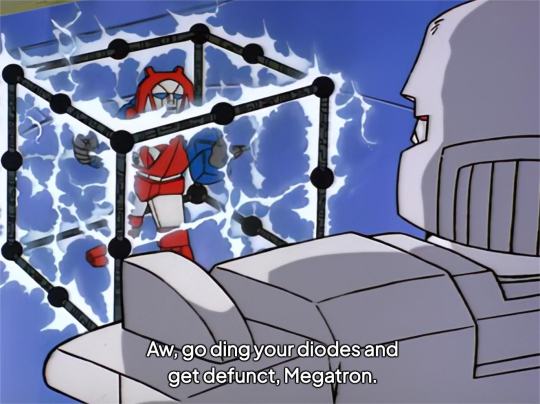
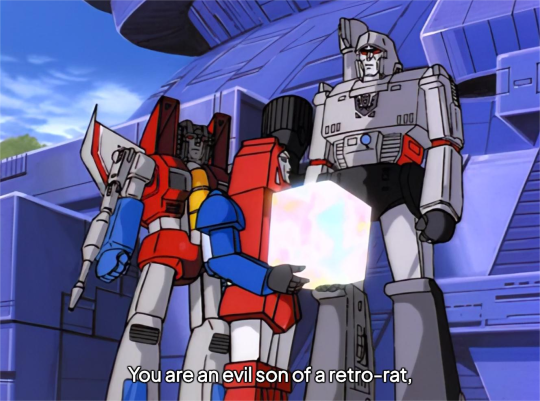
To that:
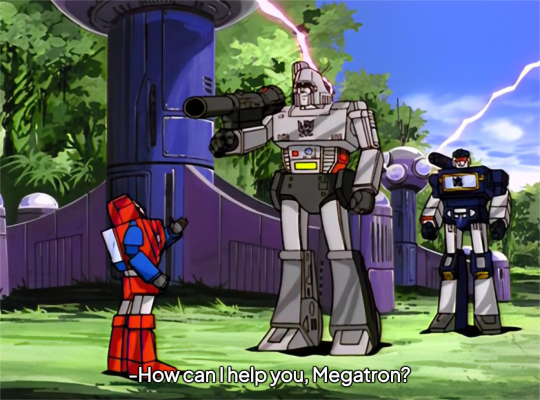
I don't think it's a long shot to understand this change of behavior as something very similar to the effects of the lobotomy treatment that was popular in 20th century psychiatry. This type of brain surgery is defined by the severance of the connections between the frontal lobe and the rest of the brain. "Often, the procedure made people quiet and docile, which they interpreted as a sign of success" - according to MNT. Which is exactly what happens to Gears without his personality modulator.
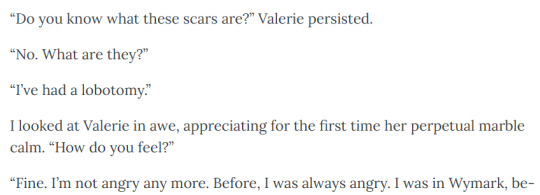

This is a Sylvia Plath dialogue with a lobotomized patient from her 1950s novel The Bell Jar. And Gears "perpetual marble calm". This excerpt came to my mind because that book along with a couple of movies made me (almost irrationally) scared of these kind of procedures when I was younger. By being underage (back then), depressed and gay I thought I was a perfect victim for invasive, radical ways of making me "normal". Times changed of course, but back then disabled people, the LGBTQ+, women and others with a "strange behavior" were the main targets for lobotomy.
When Ironhide sees Gears transformation from irritable runt to docile servant he is appalled, disgusted...
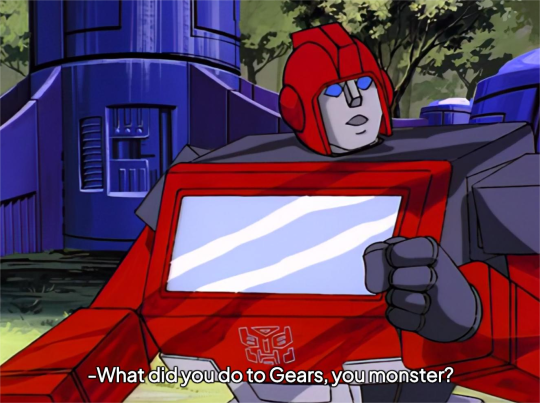
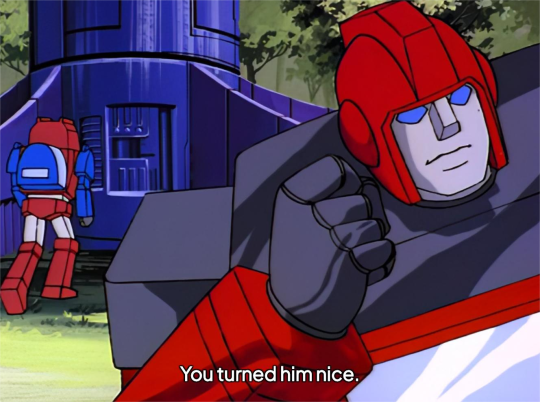
LOL
How dare Megatron turn Gears into that? Removing the agency and liberty of an individual while keeping them alive, Megatron was way out of line, right? However... by the end of the whole conflict, a complex moral twist takes place among the good guys, the Autobots, when Trailbreaker admits:


Here, Trailbreaker position is reminiscent of that of husbands who would approve of the docile behavior of their wives after the lobotomy surgery. Particularly in a time where women were expected to be calm, cooperative and attentive to domestic affairs. Also I hate the fact that Bumblebee calls that calm behavior "photovoltaic pussycat" because that sounds cool, but in that case it's terrible, stop trying to make debilitating procedures cool Bumblebee! This interaction quickly took me to some dark places, a place where your loved ones can choose how you should behave, a place where you have no choice but to conform to a social expectation, making others lives easier while turning you into a limited being. Maybe not the place where the writers of this kid's tv show wanted to take their audience, I'm aware, but regardless, that's where I ended up, for a while.
They vote and decide to keep Gears without his personality modulator, and Prime agrees:
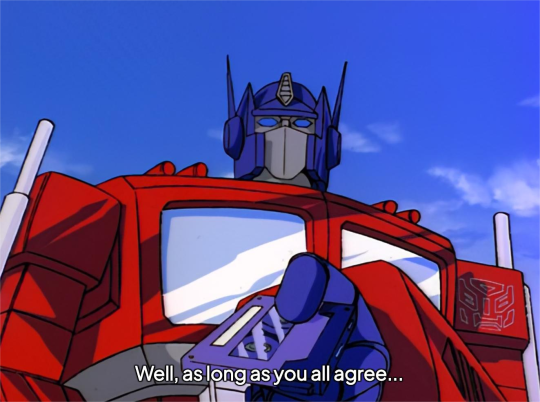
With this sentence Optimus perfectly synthesizes the concept of majoritarianism in the way of perpetrating the tyranny of the majority. "If the majority rules, what is to stop it from expropriating the minority, or from tyrannizing it in other ways by enforcing the majority's religion, language, or culture on the minority?" (Oxford Dictionary). In that case, Gears had his rights to keep his behavior and personality removed from him by a democratic rule. That reminds us that democracy as a political system is not without its flaws. If the majority agrees on it, does that make it immediately a right or good decision?
Luckily Gears interferes, with a threat that sounds both violent and vague at the same time, a nice touch of writing for a kid's show:


Never change Gears, nothing wrong with a little threat of violence to guarantee your rights to be your own person.
After his threat the Autobots listen to Gears, respect his wishes and Prime just gives his personality modulator back, after that they all laugh!
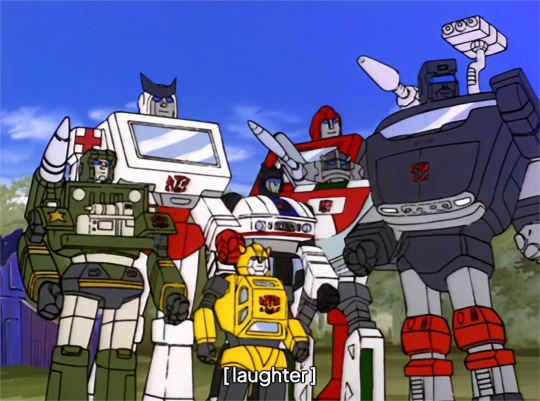
And honestly... I think they're happier with Gears just the way he always were, grumpy and irritated, but his true self, look at their smiling faces!
At the end of the day this episode's moral is probably: Hey kids, if they're not evil, accept your loved ones for who they are. Let's keep lobotomy procedures in the past and learn to respect our differences based on our deeply flawed history. At least, that's my, admittedly, very specific take on it...
I know this episode took me places and reminded me of old fears and thoughts I didn't have for a while, but it felt good to organize and share these ideas. Thanks for reading it.
#this is not a review#little essay#it's not really my blog without a unnecessary deep dive into the media i'm into every once in a while#the transformers#sylvia plath#the bell jar#long ass post#cw mental illness#cw lobotomy#tyranny of the majority#maccadam#transformes g1#bumblebee#ironhide#megatron#optimus prime#trailbreaker#gears#text#watching log
17 notes
·
View notes
Text
THERE’S SO MANY FICS I WANT TO WRITE NOT ENOUGH TIME ARGHHFJDJGJ
#my top three fandoms rn with a cast of over 30 characters + my multishipping tendencies are grappling with me by the throat rn#and my obsession with treating every getting together fic like it’s a persuasive essay#i HAVE to write 5k unnecessary build up before we can advance anywhere u must understand#anyway HNGKDJTKDBGKDBTKGNDKGNKDNF. i should be allowed to write forever and ever
7 notes
·
View notes
Text
ahhhhhhhh!!
I need to write a 4 page essay for class by tonight but my brain is full of cosmere rot and I can't seem to focus of cyber security to save my life. This is so frustrating! Just focus! I could be done with this by now if I could just do it!
#my thoughts#talking to the void#the adhd is winning#i could write an entirely unnecessary essay about having adhd as an adult and how not cute it is#but that would still leave me without an essay on vulnerability management#time to go get more coffee and get back to fighting my brain
11 notes
·
View notes
Text
thinking about a pinterest comment i saw that went something like "i've always been a selfish prick but then she came around and now i think 'i should make muffins tonight, she might skip breakfast tomorrow' im disgusting." and
Uegh
Uuehegggghhh
Uueueuee.......
#Pinterest comments are always so#Poetic#For no damn reason like HELLO???#“Im disgusting” I COULD WRITE A WHOLE ESSAY ON THAT LAST STATEMENT#something something emotional vulnerability giving people the humanity they suppress because society deems it weak and unnecessary#Uughhgghhhhh#luca talks
4 notes
·
View notes
Text
Suddenly remembered with that previous post I reblogged about a time I reblogged a post (or made a post I don't remember) referring to rpf and one of my followers went into the comments like "I hope this isn't condoning real person fiction : / it is actually really inappropriate and bad." I was like lol dw it is all in jest, but actually no. Who cares. At least as far as these people are concerned, they are major huge celebrities. They are not gonna care if I make some jokes about them kissing on tumblr.com. They have other things to worry about like idk being famous.
#idk it is just funny#in all seriousness I think if you are actively trying to contact a real person about your fictional impressions about them#and their romantic relationships that is just rude and bad and unnecessary like they don't need to know about this stop being delusional#also for minor celebrities within small groups of people or smth just respect boundaries is that too much to ask??#idk I am holding off from an essay I have to write lol sorry for the yapping today#squack
11 notes
·
View notes
Note
Do you think bucchigiri is a yaoi because I would love it I ship Matakara and Arajin and Senya and the other genius a lot?
i think that bucchigiri is sort of in that BL/BL-adjacent original anime spectrum (yuri on ice<-sk8 the infinity<-free!) based on the director's previous shows and general vibes. I think bucchigiri is kinda with sk8 in the middle of the spectrum of 'canon' queerness.
the way sk8 and bucchigiri are specifically formulated is to fall within sports anime genre conventions (which appeal to male audiences) while showcasing attractive and charming male characters with deep, near romantic bonds (appealing to a female demographic). (this isn't to say that boys like this and girls like that fyi, that's just how marketing generally works in the anime industry) this garners more of a fanbase than if the show were to market exclusively to one or the other.
unfortunately, this means shows like bucchigiri are unlikely to fully confirm anything due to the potential of stirring up controversy or alienating male viewers
similar to sk8, bucchigiri has and I think will continue to code matakara's and ara's relationship (and probably senya and ichiya's too) as somewhat romantic. i don't think they're going to make it canon, though.
the only chance I could see of having a canon queer relationship (or breakup, rather) is mayyyybe between senya and ichiya, since they're not the main characters and bucchigiri hasn't been especially afraid of being blatantly homoerotic lol
#its sad how ive just come to accept that no non-romance show is gonna give me an actual queer couple but alas#anime studios dont want to take unnecessary risks#especially when making nonadaptive anime#i mean i guess bucchigiri could pull a yoi on us but i have doubts#sorry for the mini essay in exchange for a simple question anon lol#bucchigiri?!#bucchigiri meta#analysis
12 notes
·
View notes
Text
it has taken the dragon age fandom 0.2 seconds to be annoying i guess
#the game's not even out. astonishing#liz's gamer problems#and for the record. they were being annoying already#the whole 'oh my god the game's ruined bc demons are more glowy' types were already running around#there's critique and then there's making a mountain out of a molehill#da fandom always goes with the last one it's so exhausting#valid critique: bioware has a bad track record with x thing or bioware fired a bunch of ppl and are bad employers etc#unnecessary: ten page essays on why the game is already ruined and everyone involved is doing bad things and is horrible#we don't need to be discoursing over split hairs
4 notes
·
View notes
Text
was scrounging around an old fan forum for fics yesterday (found some gems), and I forgot how much of the wild west forum fics are lol (zero tags in sight, vague summary, tells you who the pairing is if there is one (if you’re lucky), and rating with no details and thus no nuance). good luck, you’re going in blind. also, some of these commenters are BRUTAL. like more so than ffic.net (and if you’ve hung around in ffic.net comments you know how passive aggressive (and straight up aggressive) they can be 😬). I’ve gotten so used to the ao3 commenting ettiquette that it was a bit of a shock for a second lol.
#not that I haven’t seen plenty of rude or unnecessary comments on ao3 but they are much fewer and farther between#some of the best fics I’ve ever read have been on old forums or fan websites though#so the heavy lifting to find the good stuff is usually worth it to me#but man I don’t know if I would’ve had the guts to post anything of mine on one of these forums#as an aside a couple of sites that I’ve visited have had really good categorizing and tagging of stories (almost as good as ao3)#so they aren’t all as hard to find things on#ok now I will stop writing the essay that zero people asked for XD
3 notes
·
View notes
Text
god forbid you make a point about any part of bg3 WITHOUT calling wyll boring. jfc
#rambling#vent#watching a good video essay about gender binary in video games#but we just HAVE to throw in a joke about wyll being boring#i'm genuinely so over people saying that about him#especially in places it's unnecessary
6 notes
·
View notes